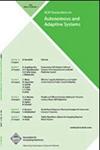协同多智能体系统中面向协调的多智能体强化社会学习
IF 2.1
4区 计算机科学
Q3 COMPUTER SCIENCE, ARTIFICIAL INTELLIGENCE
引用次数: 21
摘要
大多数关于合作多智能体系统协调的研究都研究了在合作博弈的背景下,两个(或更多)参与者如何通过固定和重复的交互在帕累托最优纳什均衡上进行协调。然而,在实际的复杂环境中,智能体之间的交互可能是稀疏的,并且每个智能体的交互伙伴可能频繁且随机地变化。为此,我们研究了社会学习框架下合作环境下的多智能体协调问题。我们考虑一个大的智能体群体,其中每个智能体与每轮从群体中随机选择的另一个智能体相互作用。通过社会学习,每个智能体通过与其他智能体的重复交互来学习自己的策略。在这种情况下,是否所有智能体都能学习到一致的最优协调策略尚不清楚。我们根据每个智能体可以感知的信息量来区分两种不同类型的学习器:个体行动学习器和联合行动学习器。在一系列具有挑战性的确定性和随机合作博弈下,评估了这两种类型的学习者的学习绩效,并研究了信息共享程度对学习绩效的影响——这是与固定代理之间重复交互的学习框架的一个关键区别。本文章由计算机程序翻译,如有差异,请以英文原文为准。
Multiagent Reinforcement Social Learning toward Coordination in Cooperative Multiagent Systems
Most previous works on coordination in cooperative multiagent systems study the problem of how two (or more) players can coordinate on Pareto-optimal Nash equilibrium(s) through fixed and repeated interactions in the context of cooperative games. However, in practical complex environments, the interactions between agents can be sparse, and each agent's interacting partners may change frequently and randomly. To this end, we investigate the multiagent coordination problems in cooperative environments under a social learning framework. We consider a large population of agents where each agent interacts with another agent randomly chosen from the population in each round. Each agent learns its policy through repeated interactions with the rest of the agents via social learning. It is not clear a priori if all agents can learn a consistent optimal coordination policy in such a situation. We distinguish two different types of learners depending on the amount of information each agent can perceive: individual action learner and joint action learner. The learning performance of both types of learners is evaluated under a number of challenging deterministic and stochastic cooperative games, and the influence of the information sharing degree on the learning performance also is investigated—a key difference from the learning framework involving repeated interactions among fixed agents.
求助全文
通过发布文献求助,成功后即可免费获取论文全文。
去求助
来源期刊

ACM Transactions on Autonomous and Adaptive Systems
工程技术-计算机:理论方法
CiteScore
4.80
自引率
7.40%
发文量
9
审稿时长
>12 weeks
期刊介绍:
TAAS addresses research on autonomous and adaptive systems being undertaken by an increasingly interdisciplinary research community -- and provides a common platform under which this work can be published and disseminated. TAAS encourages contributions aimed at supporting the understanding, development, and control of such systems and of their behaviors.
TAAS addresses research on autonomous and adaptive systems being undertaken by an increasingly interdisciplinary research community - and provides a common platform under which this work can be published and disseminated. TAAS encourages contributions aimed at supporting the understanding, development, and control of such systems and of their behaviors. Contributions are expected to be based on sound and innovative theoretical models, algorithms, engineering and programming techniques, infrastructures and systems, or technological and application experiences.
 求助内容:
求助内容: 应助结果提醒方式:
应助结果提醒方式:


